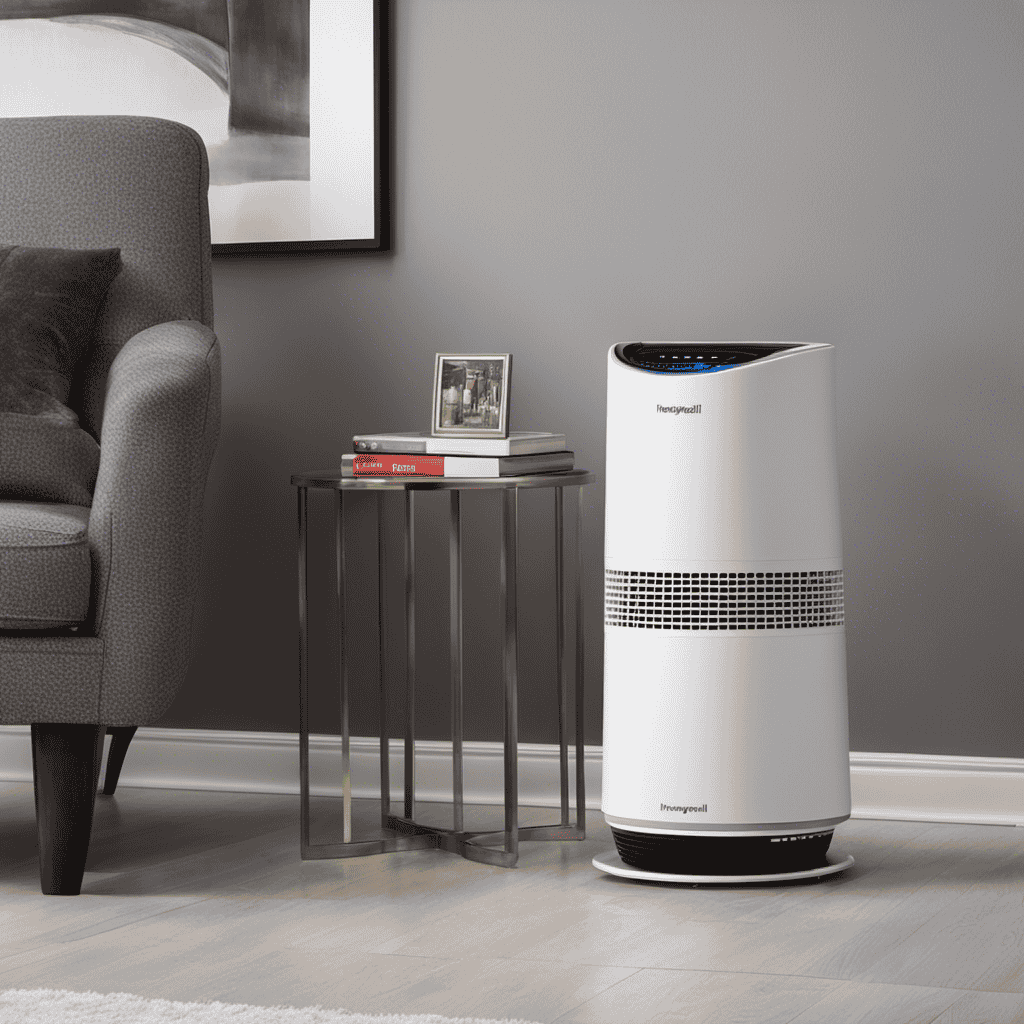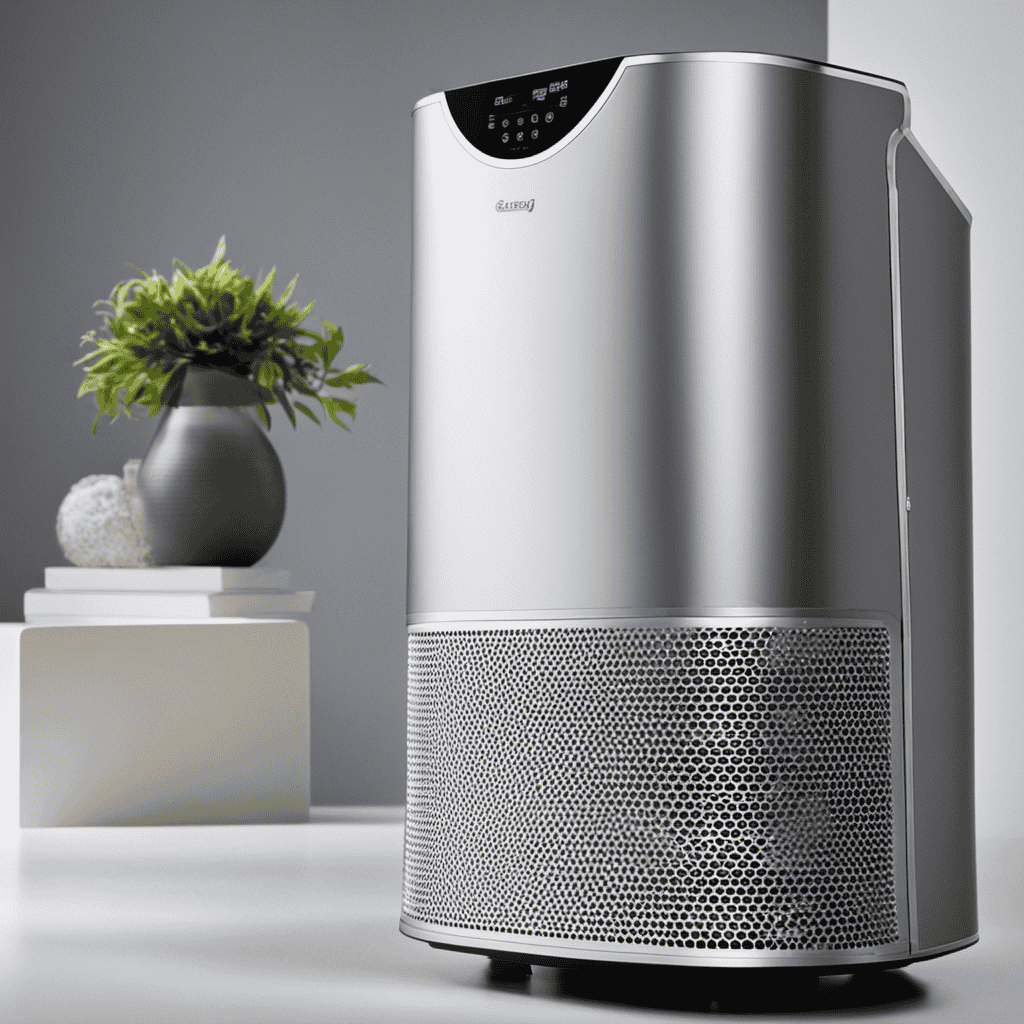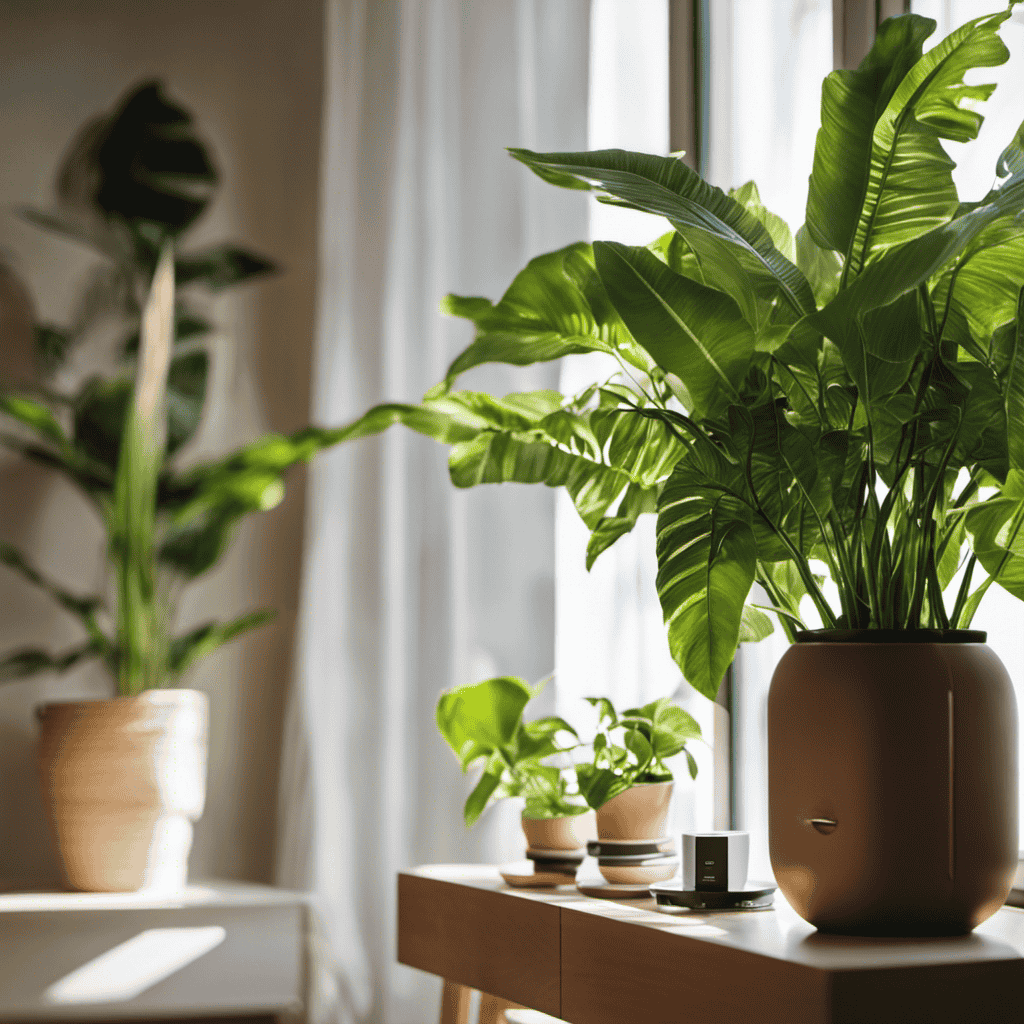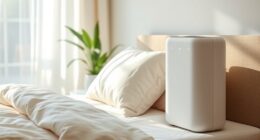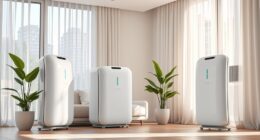I understand that selecting the right filter for your Honeywell air purifier can be overwhelming, given the numerous options available. However, fear not! This article will help you navigate through the various types of filters that work with Honeywell air purifiers.
I’ll also share key features to look for, tips on determining the right filter size, and insights into the various filtration technologies used. Plus, I’ll emphasize the importance of regularly changing your filter.
Get ready to make an informed decision and breathe cleaner air!
Key Takeaways
- HEPA filters are highly effective in removing airborne particles and reducing allergy symptoms.
- Activated carbon filters are great for eliminating odors, smoke, and harmful chemicals.
- Pre-filters capture larger particles and extend the lifespan of the main filter.
- The combination of HEPA and activated carbon filters is recommended for overall air quality improvement.
Types of Filters Compatible With Honeywell Air Purifiers
There are several types of filters that are compatible with Honeywell air purifiers. One of the most popular options is the High-Efficiency Particulate Air (HEPA) filter. HEPA filters are highly effective in removing airborne particles, including dust, pollen, pet dander, mold spores, and even bacteria and viruses. The main benefit of using HEPA filters in Honeywell air purifiers is their ability to capture particles as small as 0.3 microns with an efficiency of 99.97%. This ensures that the air you breathe is cleaner and healthier.
Another type of filter that can be used with Honeywell air purifiers is the activated carbon filter. Activated carbon filters are excellent at removing odors, smoke, and harmful chemicals from the air. They work by adsorbing the particles onto the carbon surface. While not as effective as HEPA filters in removing particles, activated carbon filters are great for improving air quality and eliminating unpleasant smells.
In comparison, pre-filters are the first line of defense in Honeywell air purifiers. They capture larger particles like dust and hair, prolonging the lifespan of the main filter.
Overall, the choice of filter depends on your specific needs and preferences. If you want to improve the overall air quality and remove a wide range of particles, a combination of HEPA and activated carbon filters is recommended.
Key Features to Look for in a Honeywell Air Purifier Filter
One important feature to consider when choosing a Honeywell air purifier is the ability of the filter to capture and trap a wide range of airborne particles. A HEPA filter is highly recommended for its exceptional performance in removing allergens, dust, pet dander, and other harmful particles from the air.
Here are some key benefits of using a HEPA filter in a Honeywell air purifier:
- Provides cleaner and healthier air by capturing up to 99.97% of airborne particles as small as 0.3 microns.
- Reduces allergy symptoms and respiratory issues by removing common triggers like pollen and mold spores.
- Effectively removes odors and harmful volatile organic compounds (VOCs) through activated carbon filtration.
- Extends the lifespan of the air purifier by preventing larger particles from clogging the main filter.
When comparing activated carbon and pre-filter options for Honeywell air purifiers, it’s important to consider your specific needs and preferences. Activated carbon filters excel at eliminating odors and VOCs, while pre-filters are effective in capturing larger particles and extending the main filter’s lifespan.
Transitioning into the next section, let’s explore how to determine the right filter size for your Honeywell air purifier.
How to Determine the Right Filter Size for Your Honeywell Air Purifier
To determine the right filter size for your Honeywell air purifier, you’ll need to check the model number on the back of the unit. The model number will provide you with the necessary information to find the compatible filter size. Once you have the model number, you can visit the Honeywell website or contact their customer support to find the appropriate filter size for your specific air purifier model.
When it comes to cleaning your Honeywell air purifier filter, it is important to follow the manufacturer’s instructions. Typically, you can clean the filter by gently vacuuming or rinsing it under cool water. However, be sure to check the user manual for any specific cleaning instructions for your particular model.
If you are experiencing any issues with your Honeywell air purifier filter, there are some common troubleshooting steps you can take. First, ensure that the filter is properly installed and seated in the unit. Make sure that the unit is also receiving power and that the fan is working properly. If the filter is dirty or clogged, it may need to be cleaned or replaced. If you have followed these steps and are still experiencing issues, it is recommended to contact Honeywell customer support for further assistance.
Understanding the Different Filtration Technologies Used in Honeywell Air Purifier Filters
If you want to understand the different filtration technologies used in Honeywell air purifier filters, you should research and compare the various options available. The right filter can make a significant difference in the air quality of your home.
Here are some key filtration technologies used in Honeywell air purifiers:
-
HEPA (High-Efficiency Particulate Air) filters: These filters can capture up to 99.97% of airborne particles as small as 0.3 microns, including dust, pollen, pet dander, and mold spores.
-
Activated carbon filters: These filters are effective at removing odors, gases, and chemical fumes from the air.
-
UV-C (Ultraviolet-C) light technology: This technology uses UV-C rays to kill bacteria, viruses, and other harmful microorganisms.
-
Ionizers: These filters release negative ions into the air, which attach to airborne particles and make them easier to capture by the filter.
Using air purifiers in your home, regardless of the different air purifier brands, has numerous benefits, such as improving indoor air quality, reducing allergy symptoms, and creating a healthier environment for you and your family.
The Importance of Regularly Changing Your Honeywell Air Purifier Filter
Regularly changing your Honeywell air purifier filter is crucial for maintaining optimal air quality in your home. By using a HEPA filter in your Honeywell air purifier, you can experience several benefits.
HEPA filters are designed to capture 99.97% of airborne particles as small as 0.3 microns, including dust, pollen, pet dander, mold spores, and smoke. This level of filtration helps to improve indoor air quality and reduce allergens, making it especially beneficial for individuals with allergies or respiratory conditions.
On the other hand, not changing your air purifier filter regularly can pose potential health risks. A dirty or clogged filter can restrict airflow and reduce the effectiveness of your air purifier, allowing pollutants to circulate in your home. This can lead to increased allergy symptoms, respiratory issues, and poor indoor air quality.
Therefore, it is important to change your Honeywell air purifier filter as recommended by the manufacturer to ensure optimal performance and maintain a healthy living environment.
In the next section, we will discuss some tips for choosing the best filter for your Honeywell air purifier.
Tips for Choosing the Best Filter for Your Honeywell Air Purifier
Now that we understand the importance of regularly changing the filter in our Honeywell air purifier, let’s discuss some tips for choosing the best filter.
Proper filter maintenance is crucial for the efficient functioning of your air purifier and to ensure clean and healthy air in your home. Here are some factors to consider when selecting a filter:
-
Filter Type: Determine the specific type of filter that suits your needs, such as HEPA or activated carbon.
-
Filter Lifespan: Consider the lifespan of the filter and how frequently it needs to be replaced.
-
Filter Efficiency: Look for filters with high efficiency ratings to effectively capture airborne particles.
-
Long-Term Cost Analysis: Evaluate the cost of replacement filters over time to make an informed decision.
Frequently Asked Questions
What Are the Potential Health Benefits of Using a Honeywell Air Purifier Filter?
Using a Honeywell air purifier filter can provide potential health benefits. It helps remove allergens, pollutants, and odors from the air, improving indoor air quality. Long term effects may include reduced respiratory symptoms and better overall well-being.
Can a Honeywell Air Purifier Filter Help With Pet Dander Allergies?
Yes, a Honeywell air purifier filter can help with pet dander allergies. Regular Honeywell air purifier filter maintenance ensures its effectiveness against airborne allergens, including pet dander, improving indoor air quality.
How Often Should I Clean the Pre-Filter on My Honeywell Air Purifier?
I clean the pre-filter on my Honeywell air purifier every two weeks. It’s an important part of regular maintenance to ensure optimal performance. Here are some tips on cleaning frequency and other maintenance tasks.
Are There Any Special Considerations for Using a Honeywell Air Purifier Filter in a Large Room?
When using a Honeywell air purifier filter in a large room, there are some important considerations. The effectiveness of the filter may be reduced, so it’s recommended to choose a higher grade filter or use multiple units for optimal results.
Can a Honeywell Air Purifier Filter Remove Odors From the Air?
Yes, a Honeywell air purifier filter can effectively remove odors from the air. Regular maintenance, such as replacing the filter as recommended by the manufacturer, ensures optimal performance and odor elimination.
Conclusion
In conclusion, selecting the appropriate filter for your Honeywell air purifier is crucial for maintaining clean and healthy indoor air. By understanding the different filtration technologies available and considering the key features of a Honeywell filter, you can make an informed decision.
Additionally, regularly changing your filter is essential to ensure optimal performance. Remember, the right filter size and type will effectively remove pollutants, allergens, and contaminants, providing you with a purified and refreshing environment.
Choose wisely and enjoy the benefits of a Honeywell air purifier.
